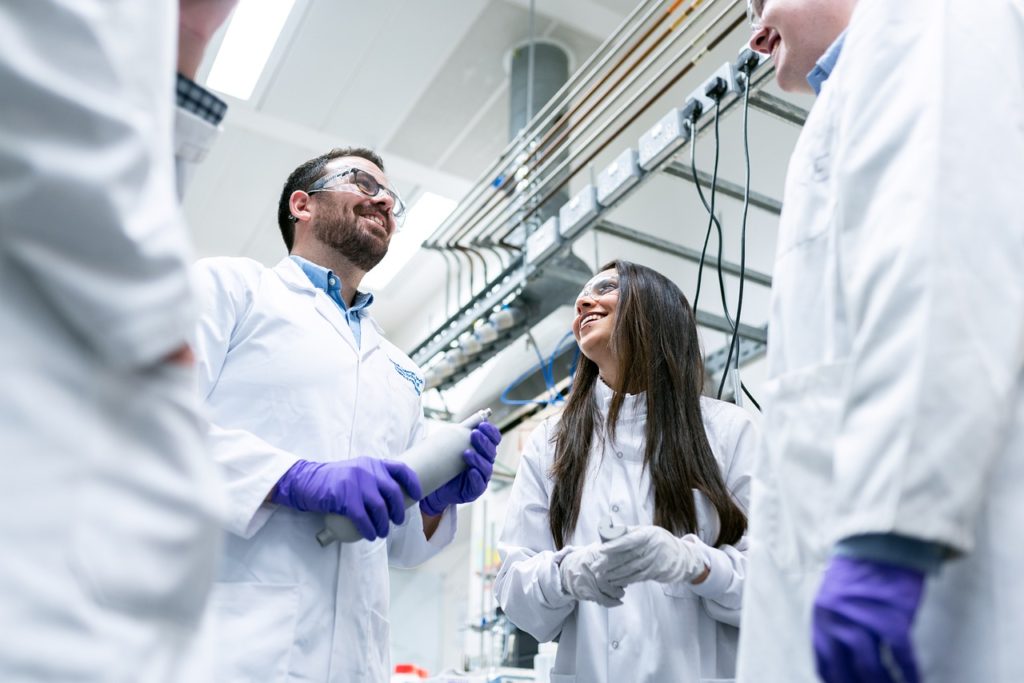Chemical industry in Singapore is one of the most rapidly growing industries. This industry provides essential chemical ingredients ranging from downstream chemicals to high-tech products. Singapore is one of the most developed economies in Asia. The chemical industry in Singapore is a pillar of the nation’s economic success. The growth of the chemical sector in the country has resulted from heavy investment in infrastructure and the creation of an industrial island complex. Along with a strong physical and financial structure, Singapore has a stable social and political segment as well.
The manufacturing industry is an essential component of Singapore’s gross domestic product (GDP), accounting for nearly 27%. In the year 2017, the Chemical industry in Singapore generated sales of around USD 40 billion. There are more than 1,252 chemical companies in Singapore. These companies offer direct employment to 28,000 people. Singapore’s strategic location and regional connectivity enable a well-established export and import market. The comprehensive free trade agreements also facilitate the trading practices in the country. Singapore has the world’s top 10 global chemical export market by volume. The country is also the 5th largest refinery export hub and is among the top 10 petrochemical hubs in the world.
Country’s prominent chemical region
Singapore does not enjoy the naturally acceptable prerequisites for successful chemical industry. The country does not have any natural resources for feedstocks, no crude oil, and no mineral deposits. Singapore does not have a major domestic market and has a short land supply. Despite this, the country is home to some of the world’s largest chemical plants. There are several major ongoing investments on a global scale that are driving the chemical industry in Singapore.
An essential contributor to the success of Chemical industry in Singapore is a newly reclaimed island known as Jurong Island. Jurong Island is Singapore’s centerpiece for petrochemical, specialty chemicals, and refining activities. The island has a highly integrated infrastructure, closely connecting suppliers and customers. The integrated ecosystem provides multiple utilities and logistic services, enabling production companies to save costs. The investments made on Jurong Island account for nearly USD 36.23 billion in the year 2017.
Singapore is home to one of the world’s largest bunkering ports with refineries. More than 50 million tons of bunker fuel were sold by the country in 2017. There are more than 100 chemical sector companies in Jurong Island. These companies include power plants, upstream and downstream chemical plants, science research centers, etc.
Commodity chemicals market
The country’s trade balance represented a surplus of around USD 5.6 billion in the year 2019. The value of exports of organic chemicals, a segment of commodity chemicals from Singapore was USD 12.8 billion in the year 2019. The export of commodity chemicals accounted for 3.3% of the country’s total exports. China and Belgium are the major recipients of Singapore’s commodity chemicals at 23 and 19%, respectively. Singapore also exports the basic chemicals produced to India, Malaysia, Netherlands, Thailand, etc. The exports from Singapore witnessed a drop of 23% compared to 2018. The value of imports to Singapore totaled USD 7.2 billion in 2019. This accounted for around 2% of the country’s total imports. The United States of America and Switzerland are the major importers of commodity chemicals to Singapore. The country also imports intermediate chemicals from India, Japan, Qatar, Germany, United Kingdom, etc. The imports to the country increased around 4% compared to the previous year.
International Scientific Private Limited (ISPL), with more than 50 years of experience is a major industrial chemicals supplier for the domestic and global chemical market. ISPL produces a vast range of chemical products including alcohols, bentonite, chlorides, phenol, etc.
Singapore has over 120 years of history with ExxonMobil. The country is home to the company’s largest integrated petrochemical plants in the world. The country is an important strategic location for ExxonMobil as the company’s largest manufacturing complex in the world is in Singapore. The company supplies chemicals throughout the Asia Pacific region. Singapore is the regional hub for ExxonMobil’s downstream and chemical businesses. The demand for commodity chemicals is growing at a slower rate than GDP growth. On the other hand, the demand for lubricants and specialty products is growing at a faster rate. Therefore, ExxonMobil is on the journey towards upgrading its molecules and increasing the production of high value-added chemicals. The company is trying to add capacity to be able to convert intermediate chemicals into specialty chemicals and lubricants. ExxonMobil receives continuous support from the Singapore government and its agencies to facilitate the company’s growth in and with the country.
Challenges and Opportunities
The globalization process is the major challenge driving competition through various industries including the chemical sector. Every industry faces several challenges like maintaining safety standards, ensuring increased productivity, energy management, etc. An innovative and experienced company aims to improve the productivity, flexibility, and efficiency of its customers in the commodity chemicals, petrochemical, and specialty chemical industries.
Technological advancement in recent years has given companies a chance to explore the Internet of Things (IoT). Asia is the world’s fastest and largest growing chemical market. Singapore plays a major role in the Energy and Chemicals Industry. Asia demands sophisticated but cost-efficient chemicals due to rapid urbanization, climate change, water, and food security. To grasp these opportunities, Singapore will have to diversify and upgrade its olefin derivative production towards high value-added chemicals.
The global chemical industry is shifting towards customized blending and eco-friendly formulations. Singapore has emerged as a sustainable and highly productive hub for manufacturing chemicals. The chemical producers in Singapore are shifting to specialized chemicals with high added value from low margin products. The country invests heavily in innovation, research, and development. The R&D investment was USD 13.77 billion in the year 2017.

